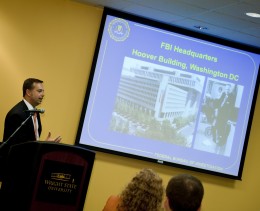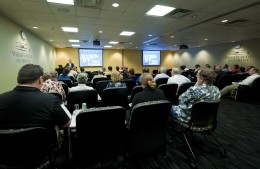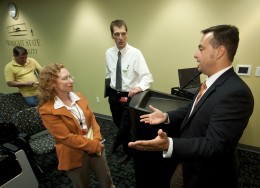
Though he is responsible for investigating reports that might involve biological pathogens, industrial chemicals, radioisotopes, chemical weapons and even nuclear weapons, Special Agent Richard Maier said 90 percent of his work deals with explosives and biological toxins.
Eleven years ago, Special Agent Richard Maier served as one of the HAZMAT safety officers for the massive evidence collection sifting operation at the Pentagon following the 9/11 attacks.
Today he’s the Weapons of Mass Destruction Coordinator for the Cincinnati field office and visits places like Wright State University that use “dual use” materials.
Whether chemical, radiological or biological, Maier’s mantra is simple: if put in the wrong hands, these materials have a dual use and could be used for acts of crime or terrorism.
“I think it’s always a good idea to be aware of potential hazards and what can happen, whether with handling materials or finding something that may look unusual and being alert to those possible events or triggers that could warrant a call or extra attention,” said Marjorie Markopoulos, Wright State biological and chemical safety officer.
Maier’s May 16 visit to Wright State, part of the FBI’s Academic Biosecurity Workshop, was coordinated to encourage safety officers to foster greater awareness of dual-use materials on campus and encourage them to call the FBI if something seems out of line—what he called, ‘tripwires.’
“At a university, an infectious disease might be studied to make a vaccine that could save lives and make the world a better place…but if for some reason a criminal element or terrorist element had that product, now we have a problem,” said Maier.
Maier says tripwires come in many shapes and sizes and can be reported by anyone. He said the most common tripwire involves someone reporting an inordinate amount of potentially dangerous materials.
“We get those kind of complaints and vet them, investigate them,” said Maier. “Someone buying a large amount of peroxide, you might find that they own a hair salon and do a lot of dye jobs but you could find a different type of person who has a criminal history that would warrant further investigation.”

Maier’s visit to Wright State was part of the FBI’s Academic Biosecurity Workshop and was coordinated to encourage safety officers to foster greater awareness of dual-use materials on campus.
Another common investigation is triggered by white-powder threat letters made infamous in October 2001 when several letters were mailed to the addresses of prominent people and politicians in Washington, D.C.
Though he is responsible for investigating reports that might involve biological pathogens, industrial chemicals, radioisotopes, chemical weapons and even nuclear weapons, Maier said 90 percent of his work deals with explosives and biological toxins.
“The classic example would be the chemicals you could buy off the shelf at any grocery store or pharmacy to be used as a dual product,” said Maier.
“In the right hands, you can clean up your scrapes and bruises, and in the wrong hands, you can use that as a precursor to develop an explosive device.”


 Small Business Farmer’s Market celebrates spirit of entrepreneurship at Wright State
Small Business Farmer’s Market celebrates spirit of entrepreneurship at Wright State  Inaugural May Daze Craft Beer Fest at Wright State to showcase local breweries, alumni
Inaugural May Daze Craft Beer Fest at Wright State to showcase local breweries, alumni  Wright State nursing, social work students experience challenges of poverty in simulation
Wright State nursing, social work students experience challenges of poverty in simulation  Immortal exhibition
Immortal exhibition  Wright State golf team headed to San Diego Regional in NCAA tournament
Wright State golf team headed to San Diego Regional in NCAA tournament 